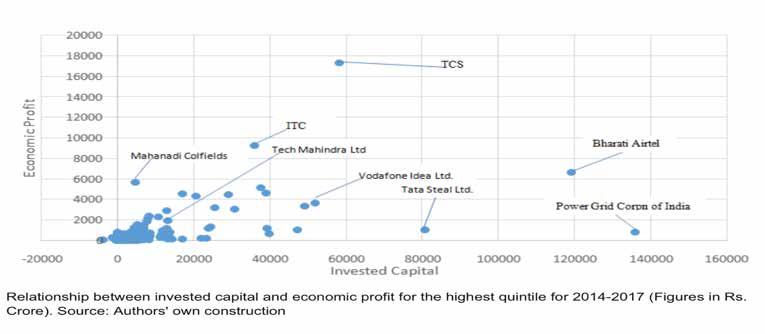
22 minute read
Delini Jayatilaka
Delini Jayatilaka
ABSTRACT: This research paper is about why Freedom is an essential component for Value Based Strategies and Value Creation. It explains how Freedom helps to create and support modern economies by providing their citizens various forms of Freedom, especially economic freedom, enabling them to unleash entrepreneurship and innovation on a significant scale. It cites research-based evidence and correlated studies between economic freedom, entrepreneurial dynamism and global innovation. It provides examples of countries such as Australia and Switzerland that consistently rate high on various global Freedom indices.
KEYWORDS: freedom, economic freedom, entrepreneurship, value creation, value based
strategy.
Freedom is not worth having if it does not include the freedom to make mistakes (Business Insider, 2022), as Mahatma Gandhi said in leading his people to real civil liberties and freedom during the struggle for independence to secure the world largest democracy, India, in the mid-20th century after nearly 400 years of British influence and colonial rule.
The freedom gained since independence has unleashed the creativity and entrepreneurial spirit and dynamism of a whole sub-continent of over a billion people; with a significant impact on value creation by many dynamic industries and multinationals on a global scale in Information Technology (IT) and Business Processing Outsourcing (BPO) due to the utilization of Value Based (business) Strategies.
For example, Indian companies such as Tata Consultancy Service (TCS), Infosys, and HCL dominate the global IT Outsourcing, BPO and Call Center industries using Value Based Strategies for Value Creation because of the substantial personal and economic freedom gained since Independence in 1947. This is illustrated by TCS’ dominance with other leading Indian firms on Value Creation by Indian companies in Figure 1 below (Jhunjhunwala et al., 2019).
In addition, according to the World Bank, India1 produces in a year the most number of Science, Technology, Engineering, and Mathematics (STEM) university graduates, 2.7 million with 43%
1 India- While making significant strides since Independence in 1947 to be the world’s largest democracy, India still lags behind in metrics of Freedom and Economic Freedom when compared to its former colonial ruler, United Kingdom, and other British colonies such as Australia which gained Independence much earlier in 1901.
of them being women; far surpassing their European and American counterparts (World Bank, 2022), and further improving its gender equality which is another measure of economic freedom (WEF, 2022).
Figure 1: Value Creation by Indian Companies, Source: Turkish Economic Review Mar 2019
SUMMARY
Freedom and the associated civil liberties are the backbone of successful modern economies and countries.
This research paper explores why Freedom may be a most essential component for Value Based Strategies that helps to create and support modern economies by providing their citizens the various forms of Freedom, especially economic freedom, enabling them to unleash entrepreneurship and innovation on a significant scale.
The paper defines Freedom and breaks it down into the multiple components of what freedom entails – personal freedom, economic freedom, political freedom, gender equality and LGBTQI+2 rights. It then defines what is a value based (business) Strategy, value creation and other related concepts of value added, cooperative and game theory.
The paper then pivots to explain how freedom and its different elements are related to value-based strategies for value creation and provides correlated research based evidence of how Freedom in all its variations helps foster and encourage entrepreneurship and economic dynamism. Also included as part of this evidence is a comparison of 2 different countries – Australia and Switzerland - that score consistently high for personal freedom, civil liberties and economic freedom resulting in significant economic prosperity for its citizens.
2 LGBTQI+ is defined as Lesbian, Gay, Bisexual, Transgender, Questioning, Intersex Plus – and is used to defined and identify different types of personal identities beyond the 2 historic identification of male and female genders - to support and assist with the acceptance and tolerance as part of personal freedom and civil liberties.
Separately, there is recent data from the 2021 Credit Suisse study to provide further evidence of Australia’s prosperity as the world’s richest nation, one would argue due to its political and economic stability fueled by an economic dynamism and entrepreneurial spirit as a result of its highly consistent political, personal and economic freedom for its citizens.
Finally, this paper concludes by summarizing how freedom generally, and economic freedom in particular, is a most essential ingredient of value based business strategy for value creation, and how certain countries like Australia and Switzerland which deploy these strategies enjoy enormous economic prosperity for its economy, companies and citizens alike.
RESEARCH TITLE AND TOPIC SELECTION
This section consists of the main research title and topic, ‘Freedom as a Value Based Strategy’ and the following research questions posed to illuminate and answer the main research topic:
RQ1: What is the definition of freedom and what are the different types of Freedom? RQ2: What are the definitions of the Value Based Strategy, Value Creation, Created Value, Added Value? RQ3: Why is Freedom important for Value Based Strategy for Value Creation and what is the relationship between them? RQ4: What is the research-based evidence, data and examples of how Freedom and specifically Economic Freedom helps to create and foster value based (business) strategy for value creation?
DEFINITIONS OF FREEDOM AND THE DIFFERENT TYPES OF FREEDOM
Definition of Freedom
The definition of freedom is “the condition or right of being able or allowed to do, say and think whatever you want to, without being controlled or limited” (Cambridge Dictionary, 2022), or it means “independence” and “the ability to act and speak freely or to go where they wish” (MerriamWebster Dictionary, 2022).
The Human Freedom Index is a comprehensive measure of freedom conducted, compiled and co-published annually by the Cato Institute and the Fraser Institute (Cato & Fraser Institute, 2022). The Human Freedom Index is defined as presenting “the state of human freedom in the world based on a broad measure that encompasses personal, civil, and economic freedom” (Cato, 2022). Human freedom is defined “as a social concept that recognizes the dignity of individuals and is defined here as the absence of coercive constraint” and “because freedom is inherently valuable and plays a role in human progress, it is worth measuring carefully as part of the index” (Cato, 2022).
“The Human Freedom Index report is a resource that can help to objectively observe relationships between freedom and other social and economic phenomena, as well as the ways in which the various dimensions of freedom interact with one another. The report is co- published by the Cato Institute and the Fraser Institute” (Cato, 2022).
The 2021 Human Freedom 7th “annual index uses 82 distinct indicators of personal and economic freedom” (Cato, 2022) in the following areas:
•“Rule of law •Security and safety •Movement •Religion •Association, assembly, and civil society •Expression and information •Relationships •Size of government •Legal system and property rights •Sound money •Freedom to trade internationally •Regulation” (Ibid)
From the 2021 Human Freedom Index, the “countries that took the top 10 places, in order, were Switzerland, New Zealand, Denmark, Estonia, Ireland, Canada and Finland (tied at 6), Australia, Sweden, and Luxembourg” (Cato, 2022).as illustrated in deep red in Figure 2 below
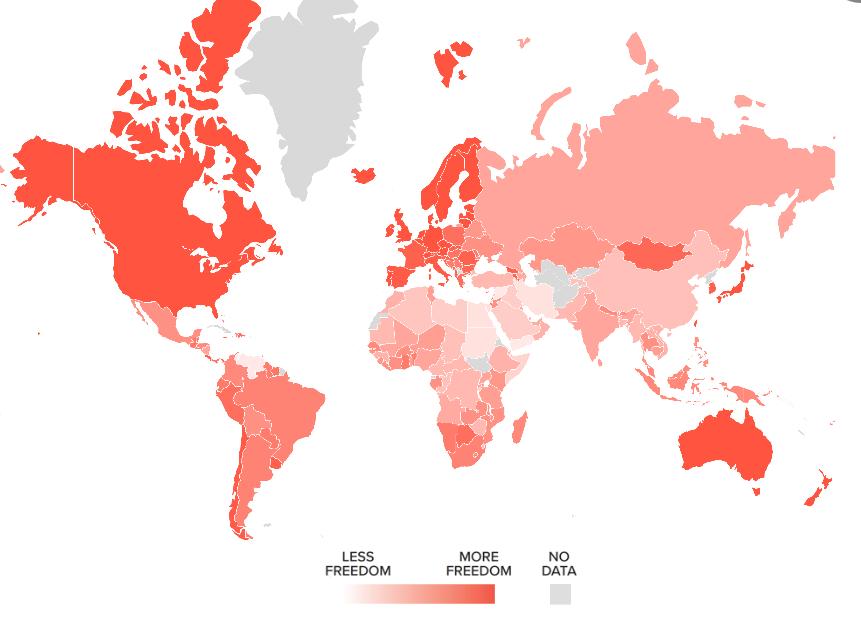
Figure 2: Human Freedom Index, Source: Cato Institute and Fraser Institute (cato.org; 2022)
Definition of Different Types of Freedom
The following section defines the different types of Freedom. It then illustrates the different indexes that measure and track the different concepts and types of freedom worldwide from 5 global think tanks – the Cato Institute, the Fraser Institute, the Heritage Foundation, Freedom House and World Economic Forum (WEF). There are 3 types of Freedom as follows:
• Personal Freedom measured by the Human Freedom Index from the Cato and Fraser Institutes • Economic Freedom measured by the Economic Freedom Index from the Heritage Foundation • Political Freedom measured by the Political Freedom Index from Freedom House
Note: Gender Equality and LGBTQI+ inclusion are considered part of the general Freedom and Economic Freedom definitions for this paper with data and metrics evidence provided in a later section of its importance for economic prosperity and value creation.
Definition of Personal Freedom
The Freedom House methodology on which the Index below is “derived in large measure from the Universal Declaration of Human Rights, adopted by the UN General Assembly in 1948” (Freedom House, 2022). Freedom Index by Freedom House measures overall freedom by country that includes “personal, economic and political freedom as illustrated by the Global Freedom Index” in Figure 3 below (Freedom House, 2022). It demonstrates that countries with the highest Freedoms (in green) are “Australia, New Zealand, Japan, Western Europe and Canada” (Freedom House, 2022).
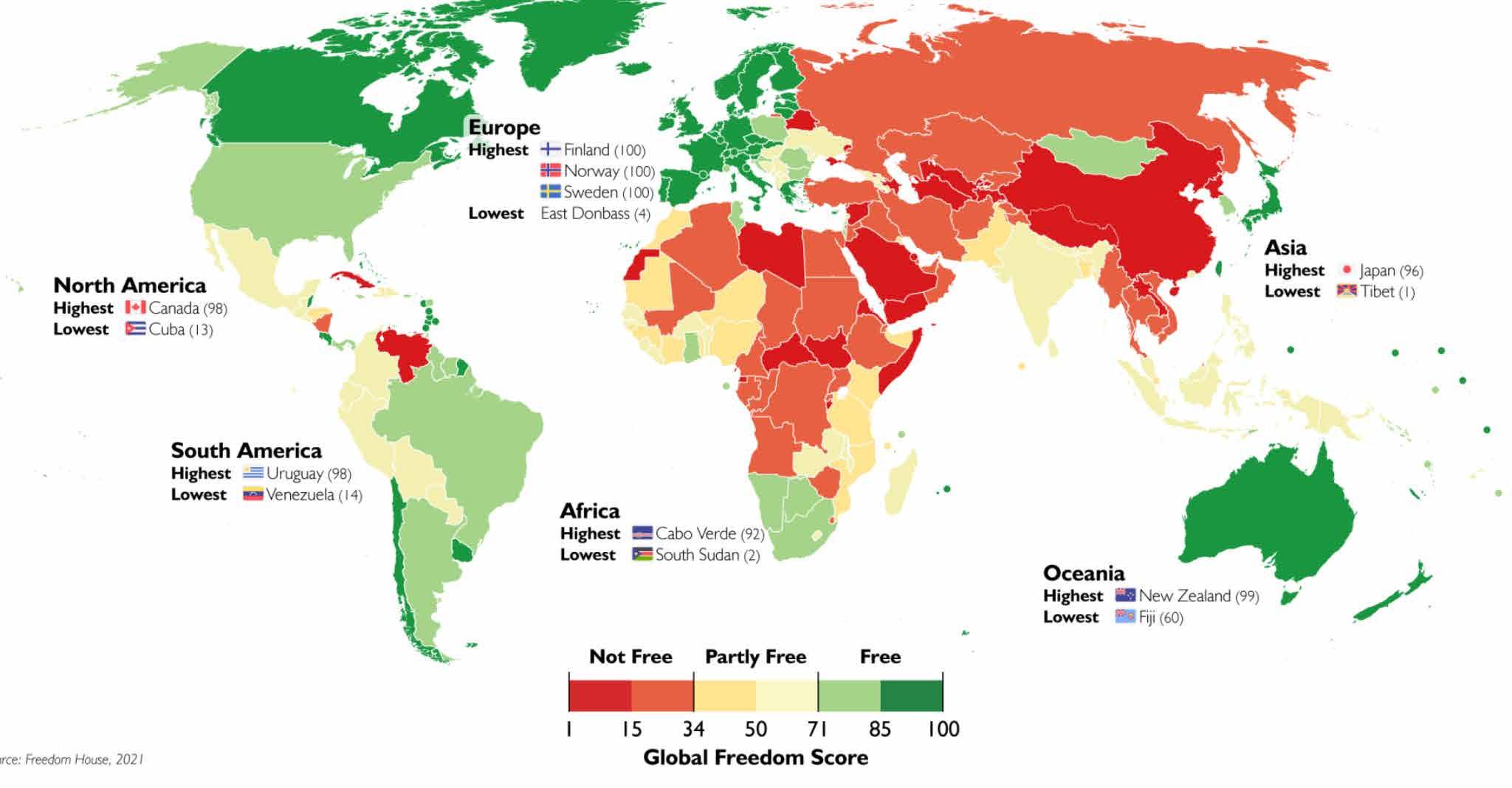
Figure 3: Global Freedom Index, Source: Freedom House
Definition of Economic Freedom
Fraser Institute According to the Fraser Institute3 (2022), the definition of economic freedom is the “personal choice, voluntary exchange coordinated by markets, freedom to enter and compete in markets and protection of persons and their property from aggression by others”.
The most economically free countries illustrated in sky blue on the world map in Figure 4 below include “Australia, New Zealand, Japan, Nordic Europe, parts of Western Europe, North America – USA and Canada and Chile in South America” (Fraser Institute, 2022).
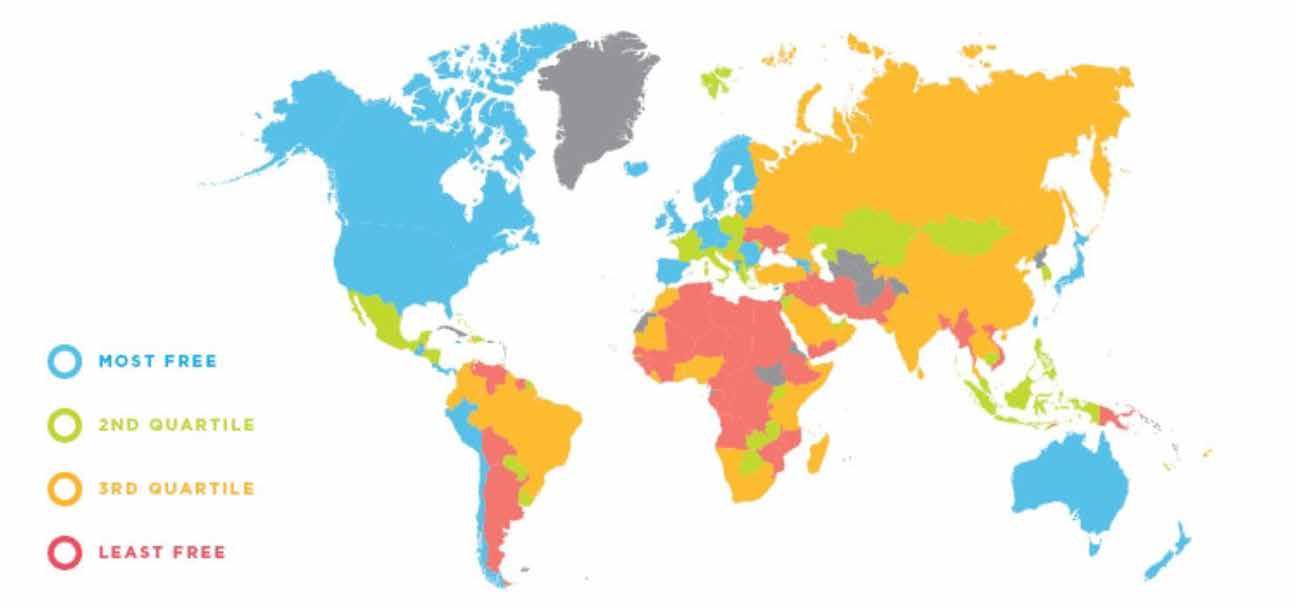
Figure 4: Global Freedom Index, Source: Freedom House
42 data points are utilized to create the EFI (Economic Freedom Index) with an adjustment for Gender Legal Rights to gauge if women have the same level of economic freedom as men (Freedom House, 2022) in the 5 following areas:
• Size of Government • Legal System and Property Rights • Sound Money • Freedom to Trade Internationally • Regulation • Gender Legal Rights Adjustment
3 The Fraser Institute, a Canadian think tank ranks in the top 15 of think tanks worldwide according to the Global Go to Think Tank Index published by the University of Pennsylvania. It is considered to have a libertarian
Heritage Foundation
According to the Heritage Foundation4 (2022) “the fundamental right of every human to control his or her own labor” is the definition of economic freedom; where “in an economically free society, individuals are free to work, produce, consume, and invest in any way they please” (Heritage Foundation, 2022).
The Heritage Foundation believes that economic freedom delivers prosperity (Heritage Foundation, 2022). This is measured through its Index of Economic Freedom which reports the positive relationship between economic freedom and a number of positive economic and social metrics such as “healthier societies, cleaner environments, greater per capita wealth, human development, democracy, and poverty elimination” (Heritage Foundation, 2022).
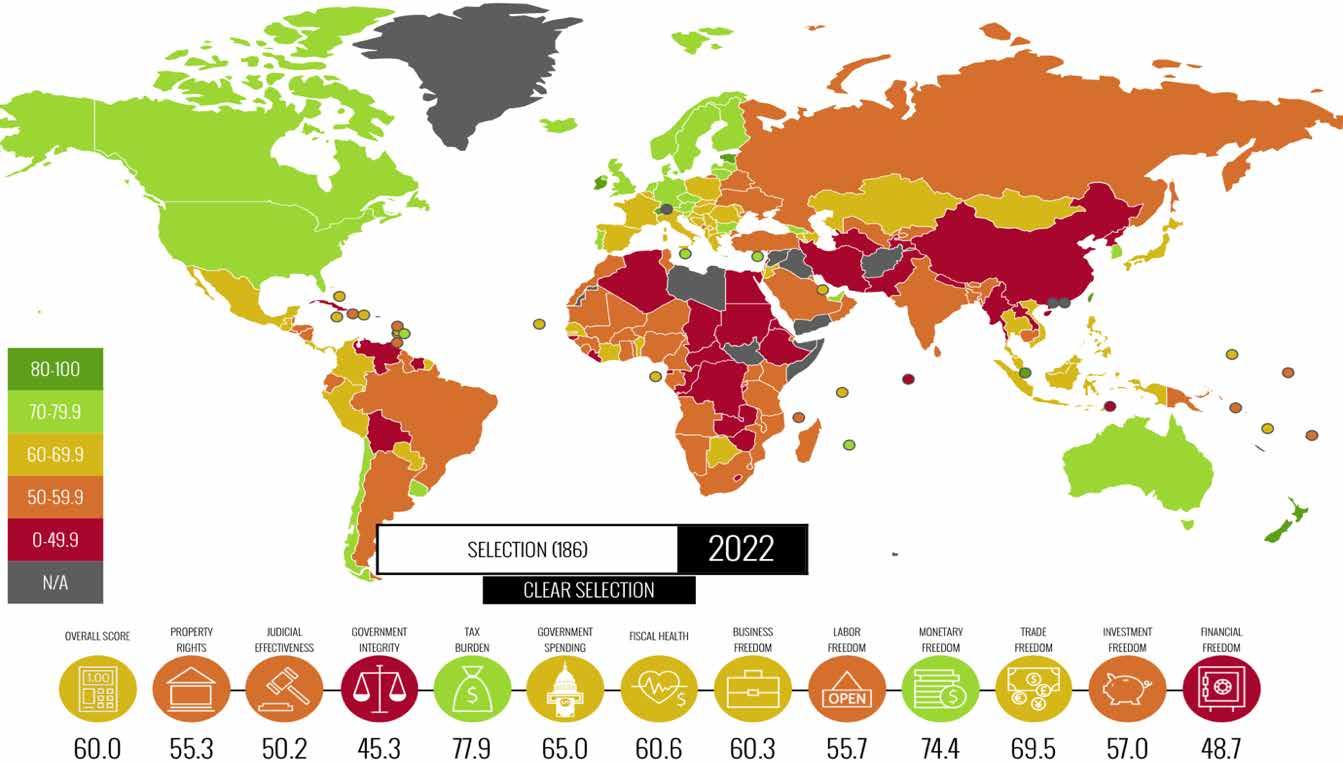
Figure 5: 2022 Economic Freedom Index, 28th Edition, Source: Heritage Foundation
The above index is based on “12 quantitative and qualitative factors, grouped into 4 broad categories, or pillars, of economic freedom as follows:
• Rule of Law (property rights, government integrity, judicial effectiveness) • Government Size (government spending, tax burden, fiscal health) • Regulatory Efficiency (business freedom, labor freedom, monetary freedom) • Open Markets (trade freedom, investment freedom, financial freedom)”(Heritage Foundation, 2022).
4 Heritage Foundation is a US public policy think tank founded in the 1970s based in Washington, D.C. and is considered to have a conservative approach, with an Economic Freedom with an index of the same name.
Political Freedom and Civil Liberties
The definition of political freedom by Freedom House (2022) and embedded in its methodology is based on “the Universal Declaration of Human Rights, adopted by the UN General Assembly in 1948.” Freedom “assesses the real-world rights and freedoms enjoyed by individuals, rather than governments or government performance per se. Political rights and civil liberties can be affected by both state and non-state actors, including insurgents and other armed groups” (Freedom House, 2022). Freedom House’s most free countries for 2022 are illustrated in the figure below and includes Australia, Western Europe, much of North America and South America and parts of Southern Africa.
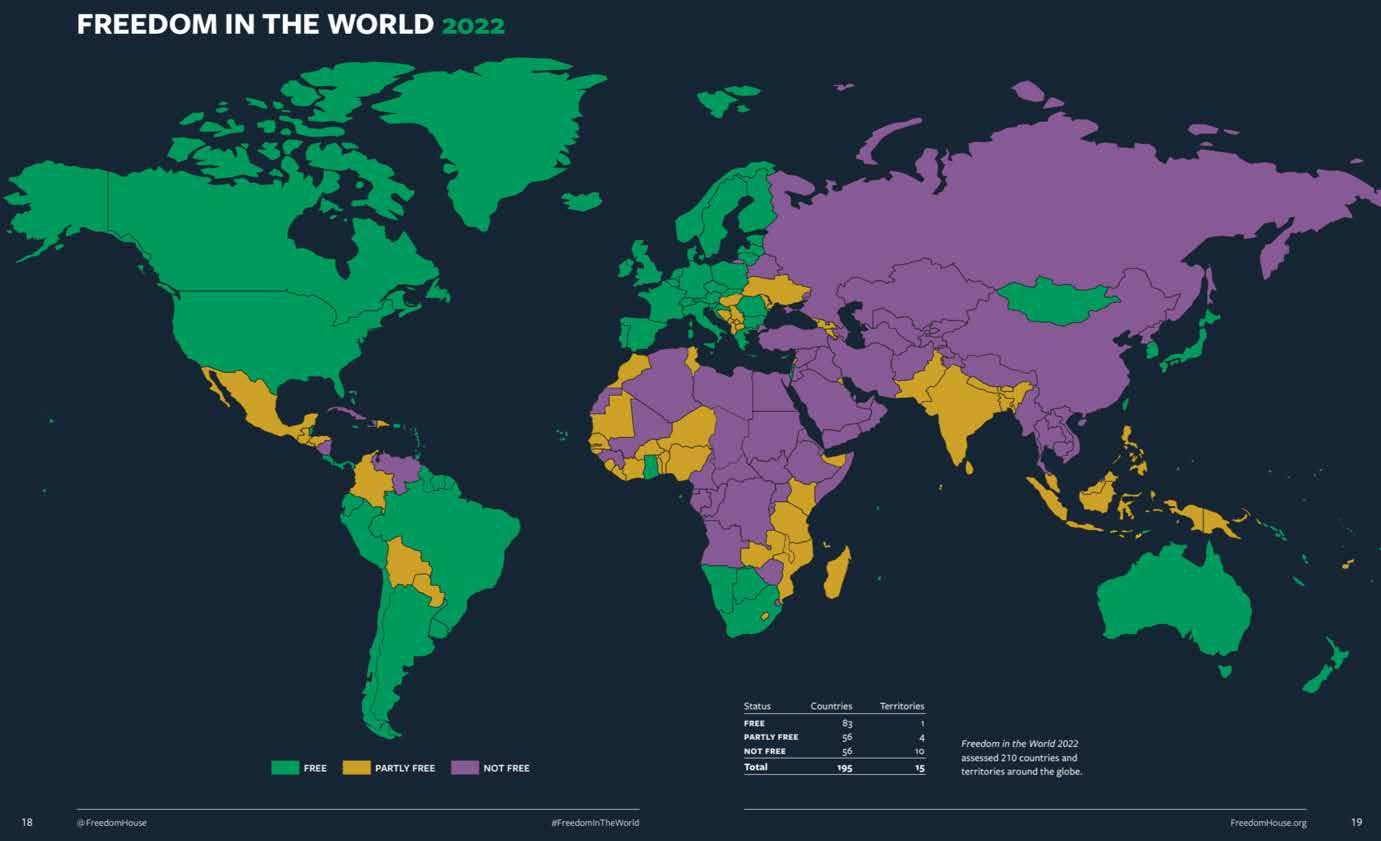
Figure 6: State of Freedom in the world, Source: Freedom House (2022)
DEFINITIONS OF VALUE BASED STRATEGY, VALUE CREATION, ADDED VALUE AND VALUE CREATED
This section provides the foundational concepts and definitions of value based (business) strategy, value creation and added value and how these ideas are related with each other and associated with cooperative game theory and game theory. These concepts are used for situational analysis of how a business operates within its own strategic framework to deliver value and how that firm competes with other companies in the wider marketplace.
The above concepts are essential for understanding the broad end-to-end value creation process for how value is created and value is added as they relate to value based business strategy, and how Freedom and Economic Freedom contribute to the above concepts and are important components.
Definition of Value Based Strategy and Cooperative Game Theory
The definition of a value based (business) strategy is based on “a values-based business that establishes a core set of values that represent who the company is, guides how it conducts its business, and acts as the check and balance on behavior, decisions, hiring, firing, training and development. Implemented correctly, it leads to a cohesive workforce that operates with transparency and trust, is proactive, has greater loyalty, and increased productivity” (klemchuck.com, 2022).
According to Brandenburger and Nalebuff (1997), there are “four routes (“value-based” strategies) that lead to the creation of such asymmetries” and that “cooperative game theory provides the underpinnings” (Brandenburger & Nalebuff, 1997). Cooperatives game theory“employs a notion of free-form interaction between players, which corresponds nicely to the active search for value creation and appropriation opportunities that characterizes business situations” (Brandenburger & Nalebuff, 1997).
Definitions Value Created, Value Creation, Added Value and Game Theory
“Creating value that can be captured is the essence of business” (Brandenburger & Nalebuff, 1997) and is defined as Value Creation. Brandenburger and Stuart (1996) defines “Value created = willingness to pay – opportunity cost”. Rappaport (1992) defines value as “a company’s ability to create value is in excess of the cost of producing it”, and is “thought to be a widely held view of value in business strategy” (Brandenburger & Stuart, 1996).
“One of the key concepts of game theory5 is added value” (Brandenburger & Nalebuff, 1997).
“The definition of ‘added value’ of a firm is defined as an upper bound on how much value the firm can capture” (Brandenburger & Stuart, 1996). Hence, “added value equals total value created with you in the game, minus total value created without you in the game” (Brandenburger & Nalebuff, 1997).
WHY IS FREEDOM IMPORTANT FOR VALUE BASED STRATEGY AND VALUE CREATION?
Freedom is a most essential, critical, and important ingredient for value based (business) strategies to help foster value creation because personal freedom, economic freedom, political freedom, and gender equality unleashes creativity, innovation, entrepreneurship, and economic prosperity. To prove this hypothesis, this section provides research-based correlations, evidence in the form of statistical studies, economic freedom indexes, and various other metrics to support this thesis. This section provides the following based research evidence:
5 “In game theory, nothing is fixed. The economy is dynamic and evolving. The players create new markets and take on multiple roles. They innovate. No one takes products or prices as given. If this sounds like the free-form and rapidly transforming marketplace, that is why game theory may be the kernel of a new economics for the new economy” (Brandenburger, 2022).
1. Various infographics and charts on the correlation between economic freedom and global innovation and entrepreneurial dynamism
2. Metrics on Australia and Switzerland including a comparison between both economies as they score consistently in the top 10 of various freedom indexes especially economic freedom to demonstrate each country’s enormous economic prosperity
3. Credit Suisse’s report on how Australia and Switzerland scored on the wealth of its citizens, thought to be the richest in the world
4. Data and metrics from the World Economic Forum, Williams Institute and ‘Open For Business’ on how gender equality and LGBTQI+ rights – another measure of freedom and economic freedom – creates value and economic prosperity in many global and progressive cities that recognize, promote and support these freedoms.
Correlation between Economic Freedom and Global Innovation, Entrepreneurial Dynamism
The various infographics below provide researched based evidence that Freedom is critical for value creation through value based strategy as follows:
• A high correlation of 0.76 between Economic Freedom and Global Innovation • High Correlation of 0.54 between Economic Freedom and Entrepreneurial Dynamism
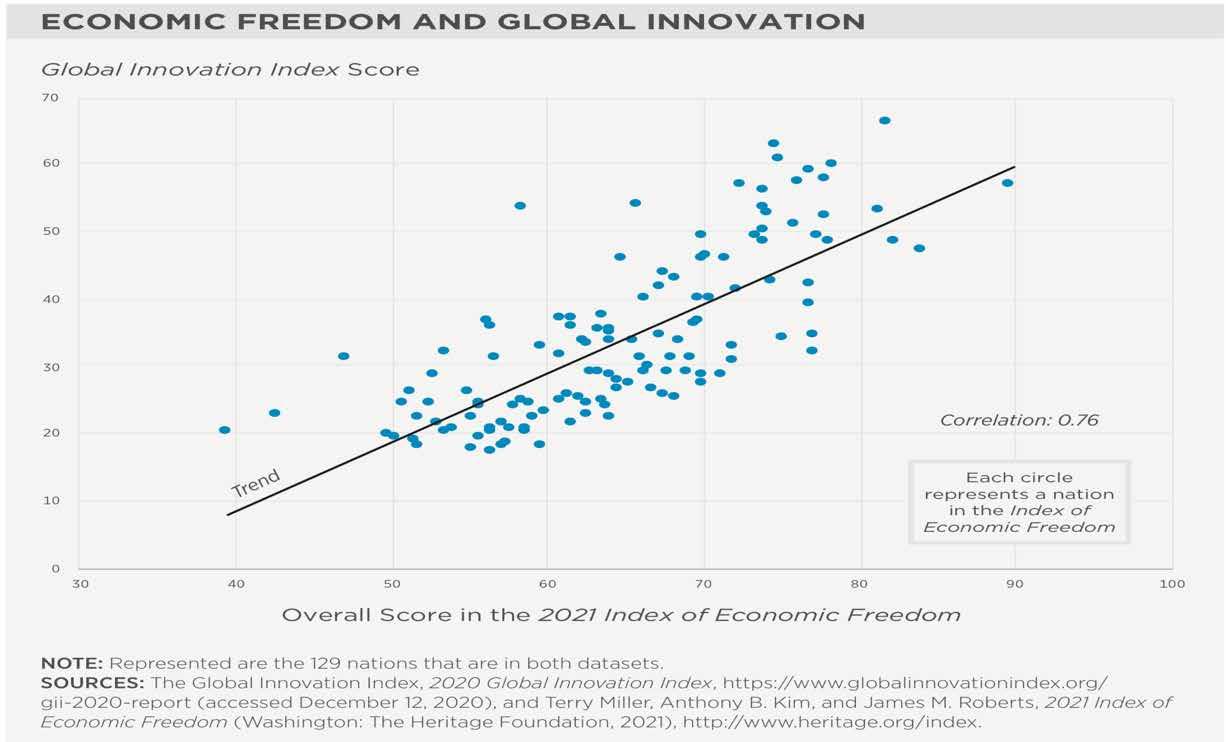
Figure 7: Economic Freedom and Global Innovation - the Global Innovation Index Score, Source: Heritage Foundation (heritage.org, 2021).
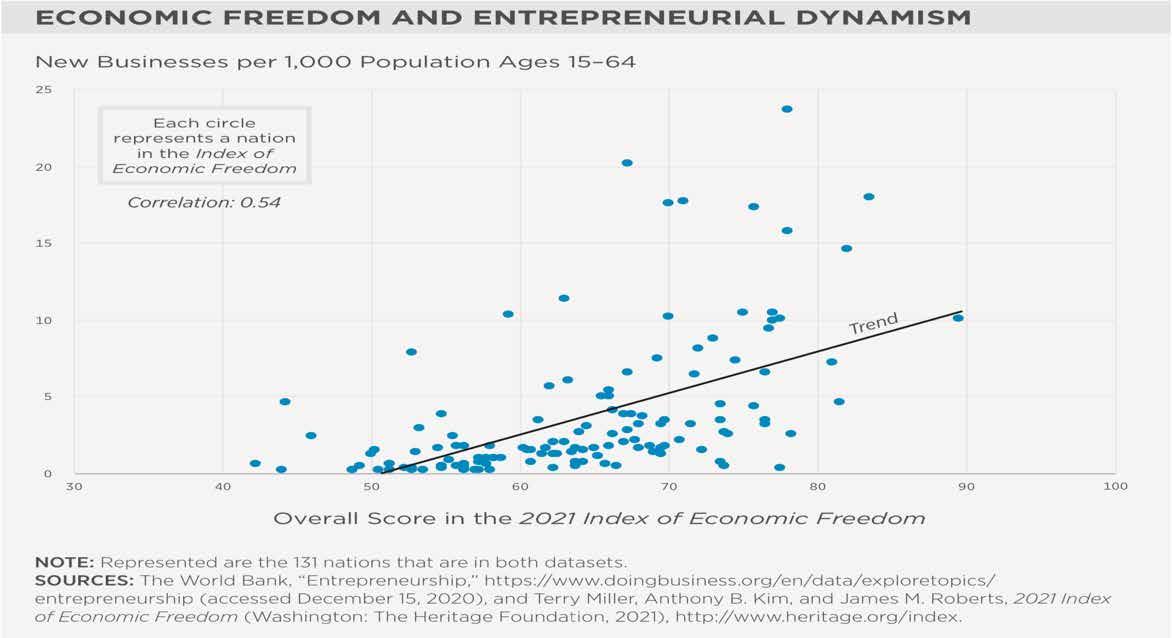
Figure 8: Economic Freedom and Entrepreneurial Dynamism – New Business per 1,000 Population Ages 15-64. Source: Heritage Foundation (heritage.org, 2021)
Comparison of Metrics between Switzerland and Australia: Evidence of How Freedom and Economic Freedom Provides Prosperity
Australia
Australia, a vast country that is the 6th largest country by land mass with a continent to itself and a population of 25+ million is well known for its commodities economy in the southern hemisphere. What may be surprising is the dynamic entrepreneurial spirit and openness of its economy and people that consistently scores in the top 10 of the various freedom and economic freedom indexes. It is a diverse country that embraces diversity with 29%+ of its population being foreign born with a strong tie to its First Nations’ roots that can trace its lineage back 60,000 years and links into its recent 200 year history as a former colony of Britain. It also has historic ties to its security partner across the Pacific, the United States, forged during the 2nd World War, and enjoys strong and deep friendship and economic ties to various countries in the Asia-Pacific region, symbiotically tied to their growth and prosperity. Australia is one of the most liberal, freedom loving, diverse and accepting democracies in the world and its people enjoy enormous economic prosperity.
Switzerland
Switzerland, is a central European country, in the crossroads of the world between Europe, both east and west, the Mediterranean, Middle-East and Africa. It is equally legendary for its neutrality, peace loving citizens, and as a wealth destination besides its famed snow covered peaks, cheese, chocolate and watches. In recent times, it has become a wealth center where 25% of the world’s funds flow through it. Switzerland with a population of 8.5 million, is also a diverse country with 4 official languages – French, German, Italian and Romansh, with many of its citizens also speaking
English and 26% of its population born overseas. Its city of Geneva, known as a city of peace, hosts many of the world’s most important global political, humanitarian and medical organizations such as the United Nations (UN), International Committee of the Red Cross (ICRC), and World Health Organization (WHO). Switzerland also consistently scores in the top 10 Freedom and Economic Freedom indexes, many times topping the index for its economic freedom and prosperity.
AUSTRALIA’S CIVIL LIBERTIES, PERSONAL AND ECONOMIC FREEDOMS RESULTS IN SIGNIFICANT ECONOMIC PROSPERITY FOR ITS CITIZENS
“Australians are the world’s richest people” (The News Daily, 2021), according to the 2021 Credit Suisse Wealth Report. It estimates 1.8 million Australians are USD millionaires based on net household wealth, that is the financial and real assets minus debts (The News Daily, 2021). This evidence of Australia’s prosperity as the world’s richest nation, one would argue is due to its political and economic stability fueled by an economic dynamism and entrepreneurial spirit as a result of its highly consistent political, personal and economic freedom for its citizens.
The 2021 Credit Suisse report analysis found that Australians were the richest people in the world, with a median wealth per adult of $US238,070 and estimates that by 2025, 3.1 million Australians will be millionaires. It also reported that Australia and New Zealand had lower levels of wealth inequality compared to other developed nations using the Gini coefficient, a measure of inequality, and performed better than France, Germany, China, Brazil, Russia, India, the US and the UK (The News Daily, 2021).
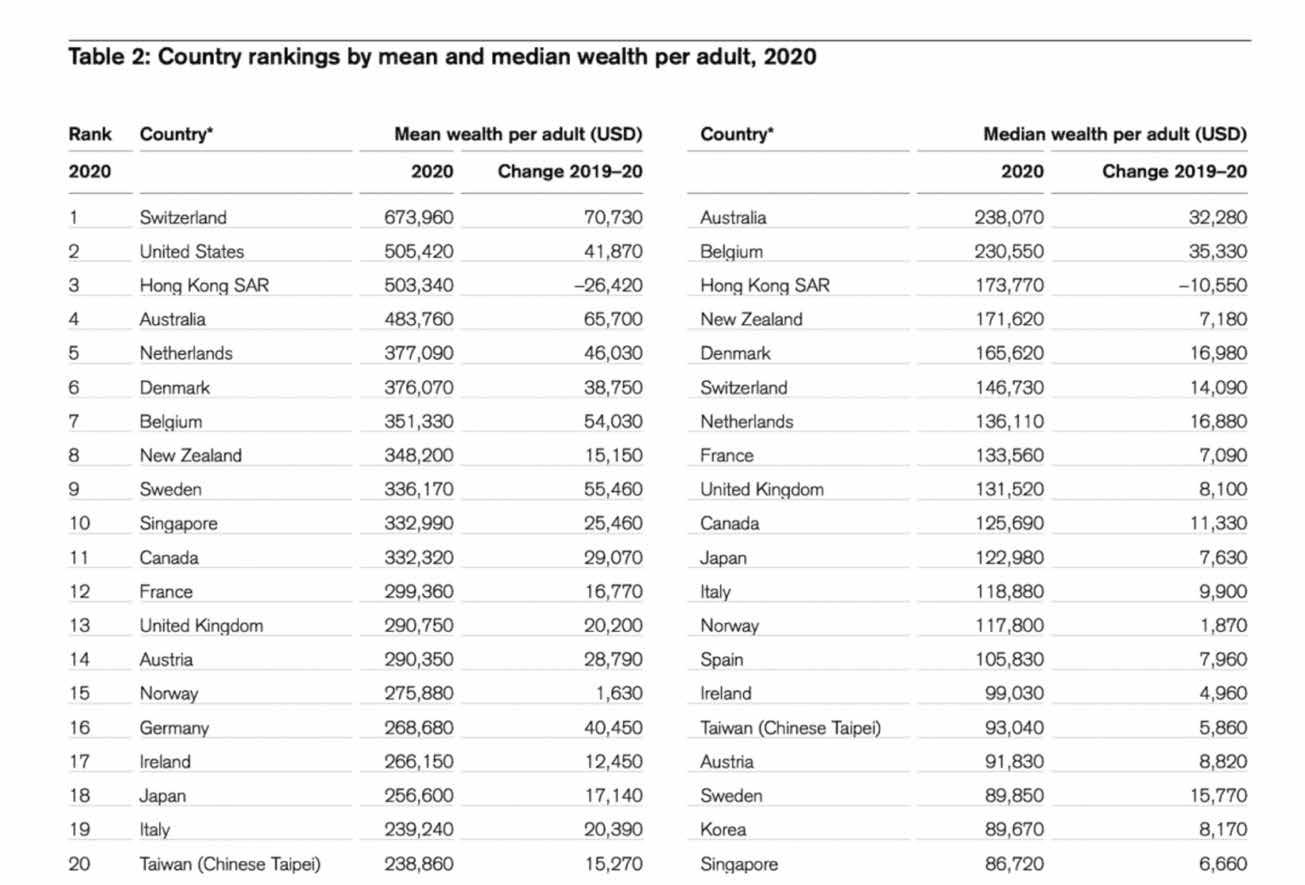
Figure 10: Source: Credit Suisse Wealth Report 2021. Source : www.thenewsdaily.com.au
Gender Equality Data and Metrics Evidence
According to the UN “gender, equality and the empowerment of women and girls are not just a goal in itself but a key to sustainable development, economic growth and peace and security” (WEF, 2018). Research has demonstrated that society improves for everyone when women have substantial rights and gender equality (WEF, 2018).
According to WEF’s 2018 research report, Unrealized Potential: The High Cost of Gender Inequality in Earnings, the following data illustrates its point:
• $160.2 trillion estimated human capital global wealth loss for 141 countries if one assumes women earn the same as men or the loss is twice the current global GDP • 38%, women account for human capital wealth versus 62% for men globally • Less than 33%, women’s human capital wealth in low and lower-middle income countries • Largest losses in OECD in absolute terms due to gender inequality, on a per capital basis of
USD 23, 629 per person globally and losses tend to increase in absolute value with increase in economic development • 21.7% increase of human wealth increase or 14% total wealth gain if women earn as much as men
DATA AND METRICS ON LGBTQI+ RIGHTS AND INCLUSION
According to the Open for Business Study (2018), economies that are more inclusive are better placed to recover from the shocks, as there is a positive correlation that exists between LGBTQI+ inclusion and economic resilience. It appears that cities that embrace diversity may reap an ‘inclusion dividend’ in that LGBTQI+ inclusion is correlated to the resilience of a country’s economy (Open for Business, 2018).
Open For Business, a coalition of companies advancing LGBTQI+ equality, illustrates a positive correlation (0.67) between resilience in an economy and acceptance of LGBTQI+ as illustrated in the graph (Open for Business, 2018). The finding includes a 1 point increase in social acceptance equals a 3 point increase in the economic resilience index, taking into account GDP per capita (Open for Business, 2018).
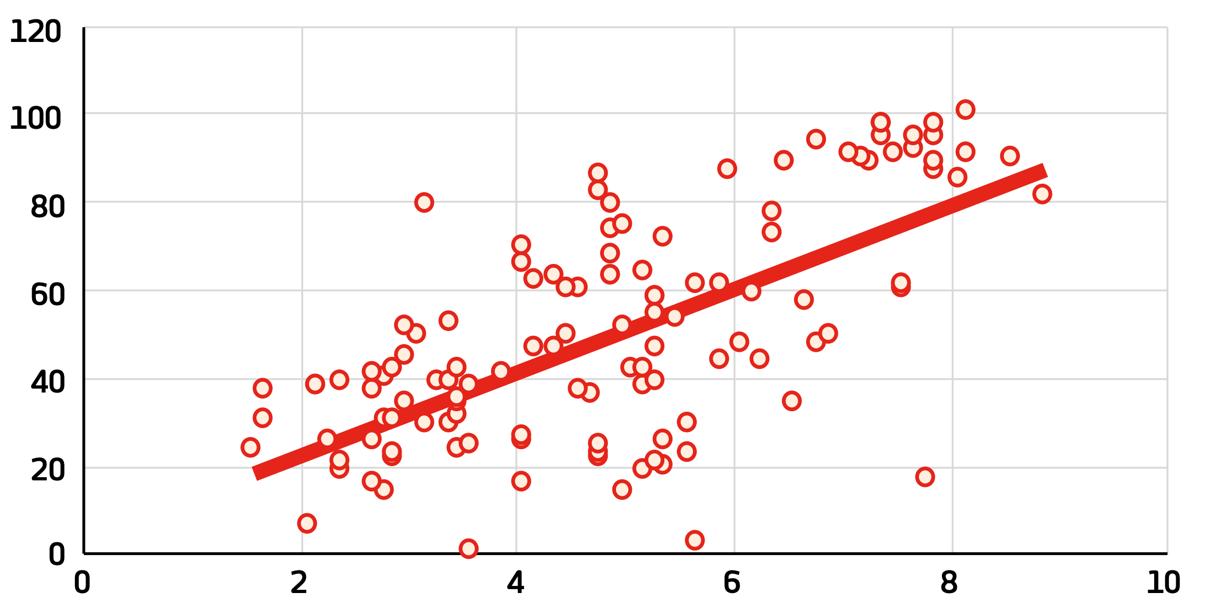
Figure 11: The social acceptance of LGBT+ people (x axis) as compared with resilience score (y axis). Source: Williams Institute, FM Global Resilience Index, Open For Business
According to the report, there is evidence that “LGBTQI+ inclusive cities have stronger “innovation ecosystems”, higher levels of entrepreneurialism, are better to attract talent and provide a high quality of life” (Open for Business, 2018).
Further evidence suggest the following:
•Innovation is a critical component of a city’s competitiveness (Open for Business, 2018). •Inclusive cities score higher on the 2ThinkNow Innovation Index, with a correlation of 0.62 with scores of social attitudes towards LGBTQI+ people and that LGBTQI+ inclusive cities are more innovative places (Open for Business, 2018).
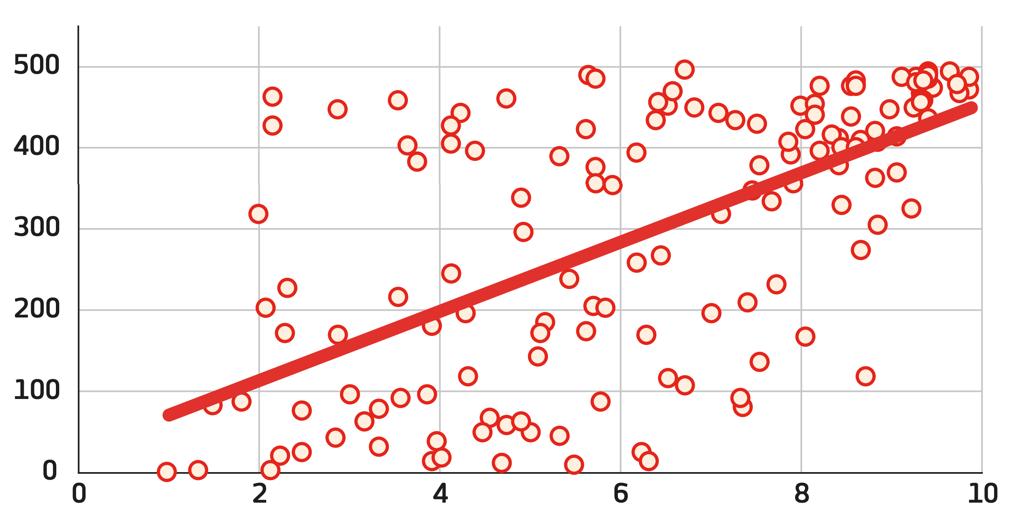
Figure 12: The social acceptance of LGBTQI+ people (x axis) as compared with innovation score (axis). Source: Williams Institute, FM Global Resilience Index, Open For Business Report
•Cities with greater concentrations of talent and skills are more competitive and resilient, while cities that are not LGBTQI+ inclusive tend to suffer “brain drain” (Open for Business, 2018) •Cities in countries with anti-LGBTQI+ policies or attitudes are much more likely to lose their talent, with examples being Accra, Kampala, Lagos, Nairobi and Moscow (Open for Business, 2018). •Diversity feeds a “clustering effect” for young talent, according to research evidence by the economist Enrico Moretti (Open for Business, 2018). •LGBTQI+ inclusion appears to be a signaler of openness, diversity and culture and cities that embrace diversity reap an “inclusion dividend” as a catalyst for innovation and growth (Open for Business, 2018).
CONCLUSION
It becomes clear that Freedom in all its forms, especially Economic Freedom, is a major factor in Value Based Business Strategies and Value Creation resulting in the creation of wealth and value, not only for countries but also cities within those countries, and for the businesses that operate there.
BIBLIOGRAPHY
1. Brandenburger, A.M & Stuart Jr, H.W. (1996) Value-based Business Strategy, Journal of
Economics & Management Strategy, 5, (1), pp. 5-24.
2. Brandenburger, A.M & & Nalebuff, B. (1997) The Added-Value Theory of Business,
Manufacturing, 4th Quarter, 9, Booz & Company.
3. Cambridge English Dictionary, www.dictionary.cambridge.org/dictionary/english/freedom [Accessed: 21 January 2022)
4. Business Insider (2022) Mahatma Gandhi Famous Quotes & Slogans, India Bureau, www.businessinsider.in [Accessed: 05 March 2022]
5. Cato Institute (n.d.), https://www.cato.org/ [Accessed: 02 February 2022]
6. Fraser Institute (n.d.), https://www.fraserinstitute.org/ [Accessed: 02 February 2022]
7. Freedom House (n.d.), https://freedomhouse.org/ [Accessed: 02 Feb 2022]
8. 2ThinkNow Innovation Index (n.d.) Innovation Cities Index 2021, www.innovation-cities. com/index-2019 [Accessed: 05 March 2022]
9. The Heritage Foundation (n.d.), https://www.heritage.org/ [Accessed: 22 January 2022]
10. Jhunjhunwala, A., Datta Chaudhuri, T. & Bhamrah, G. (2019) Value Creation by Indian
Companies, Turkish Economic Review. DOI: 10.1453/ter.v6i1.1835
11. Klemchuk (n.d.) Ideate Blog, https://www.klemchuk.com/ [Accessed: 05 February 2022]
12. Merriam-Webster Dictionary, www.merriam-webster.com/dictionary/freedom [Accessed: 22 January 2022]
13. The New Daily (2021) Australians are the richest people in the world, says Credit Suisse, https://thenewdaily.com.au/finance/finance-news/2021/06/24/australian-millionaries-credit-suisse/ [Accessed: 05 March 2022]
14. Open for Business Coalition (2018), Open for Business Study Report.
15. World Economic Forum (2020) Great Reset: Why LGBT+ inclusion is the secret to cities’ post-pandemic success, https://www.weforum.org/agenda/2020/06/lgbt-inclusion-cities-post-covid-reset-recovery/ [Accessed: 05 March 2022]
16. World Bank (2018) Unrealized Potential: The High Cost of Gender Inequality in
Earnings, https://www.worldbank.org/en/topic/gender/publication/unrealized-potential-the-high-cost-of-gender-inequality-in-earnings [Accessed: 06 March, 2022]
Delini Jayatilaka is a current DBA candidate at EU Business School, Geneva Campus.
CALL FOR PAPERS
ONRESEARCH (Tenth Edition; Spring, 2023)
ONRESEARCH is now inviting proposals for its tenth edition, aimed to be published tentatively in May 2023, in the form of empirical and theoretical papers, cases, and book reviews in one of its many focus areas. ONRESEARCH is the flagship, academic, open-access, peer-reviewed journal, publishing the highest quality of scholastic works in the field of applied business research. The periodic review publishes both scholarly and expository articles on a diverse range of subject and thematic areas for an international and interdisciplinary readership. The periodic review is published on a biannual basis, and invites submissions based on global “call for papers.” The publication accepts submissions from leading experts, industry leaders, academics, and senior students, which meet the blind screening and peer review standards set forward by the advisory board.
Abstract Submission (250 words): February 03, 2023
Confirmation of Acceptance of Abstract: February 10, 2023
Final Manuscript Submission: April 07, 2023
Peer Review Process/Copy Editing: April 10 – May 08, 2023
Expected Date of Publication: May 31, 2023
THOMAS SOWELL
Geneva Rue Kléberg 6 1201 Geneva Switzerland T +41 22 779 26 71 F +41 22 779 26 73 info.gva@euruni.edu
Other campuses in:
Barcelona Diagonal Campus: Diagonal 648 bis 08017 Barcelona Spain
Ganduxer Campus: Ganduxer 70 08021 Barcelona Spain
T +34 93 201 81 71 F +34 93 201 79 35 info.bcn@euruni.edu Munich Theresienhöhe 28 80339 Munich Germany T +49 89 5502 9595 F +49 89 5502 9504 info.muc@eumunich.com
Online T +34 93 201 81 24 info.dgtl@euruni.edu
SCAN FOR INFORMATION FIND US ON
@EU_Business_School
EUBusinessSchool
@EU_group
EU Business School
euruni.edu/blog
VALIDATING & ACCREDITING PARTNERS
MEMBER OF






